Durango 2WD V8-5.2L VIN Y (1999)

Engine Oil: Description and Operation
WARNING: NEW OR USED ENGINE OIL CAN BE IRRITATING TO THE SKIN. AVOID PROLONGED OR REPEATED SKIN
CONTACT WITH ENGINE OIL. CONTAMINANTS IN USED ENGINE OIL, CAUSED BY INTERNAL COMBUSTION, CAN BE
HAZARDOUS TO YOUR HEALTH. THOROUGHLY WASH EXPOSED SKIN WITH SOAP AND WATER. DO NOT WASH SKIN
WITH GASOLINE, DIESEL FUEL, THINNER, OR SOLVENTS, HEALTH PROBLEMS CAN RESULT. DO NOT POLLUTE, DISPOSE
OF USED ENGINE OIL PROPERLY.
ENGINE OIL SPECIFICATION
CAUTION: Do not use non-detergent or straight mineral oil when adding or changing crankcase lubricant. Engine failure can result.
API SERVICE GRADE CERTIFIED
Engine Oil Container Standard Notations
In gasoline engines, use an engine oil that is API Service Grade Certified. Standard engine oil identification notations have been adopted to aid in the
proper selection of engine oil. The identifying notations are located on the label of engine oil plastic bottles and the top of engine oil cans. MOPAR(R)
only provides engine oil that conforms to this certification.
SAE VISCOSITY
Temperature/Engine Oil Viscosity Recommendation
An SAE viscosity grade is used to specify the viscosity of engine oil. SAE BOW-30 specifies a multiple viscosity engine oil. These are specified with
a dual SAE viscosity grade which indicates the cold-to-hot temperature viscosity range. When choosing an engine oil, consider the range of
temperatures the vehicle will be operated in before the next oil change. Select an engine oil that is best suited to your area's particular ambient
temperature range and variation.
ENERGY CONSERVING OIL
An Energy Conserving type oil is recommended for gasoline engines. The designation of ENERGY CONSERVING is located on the label of an
engine oil container.
